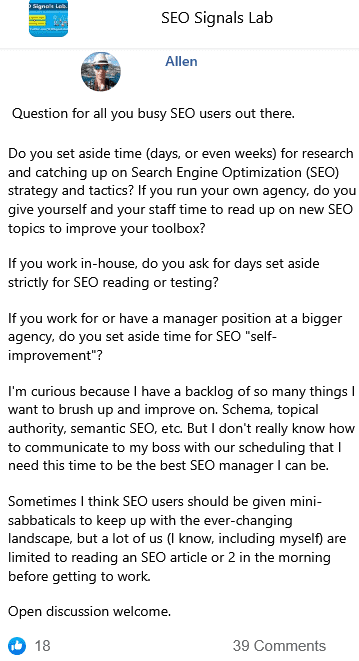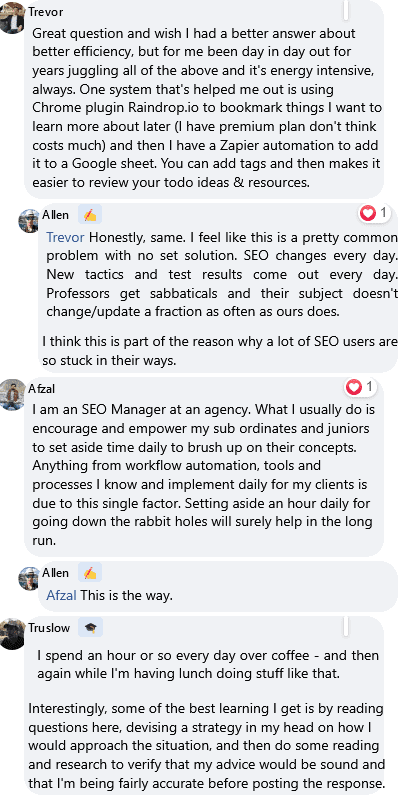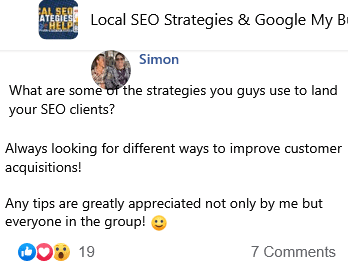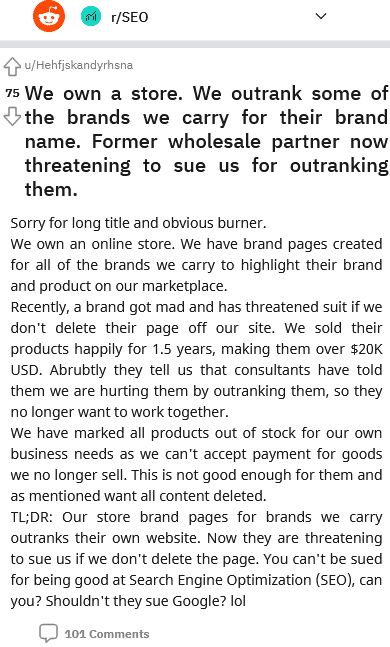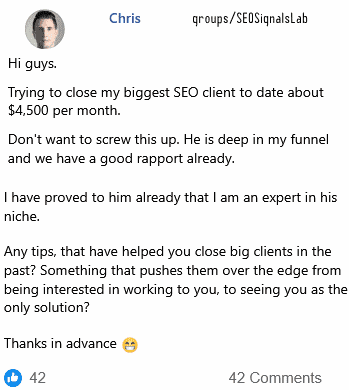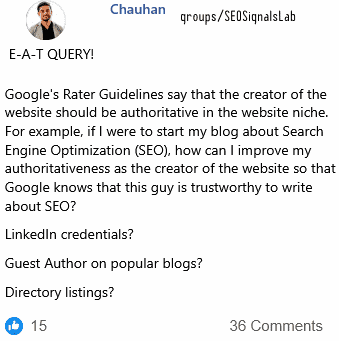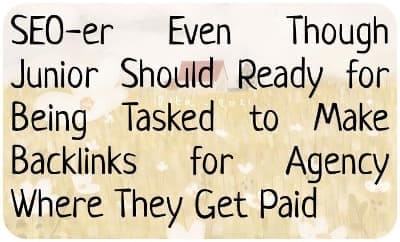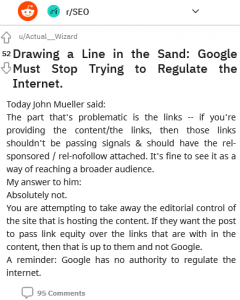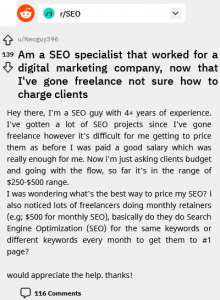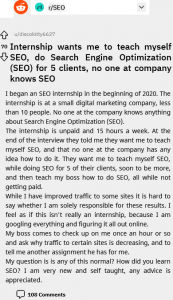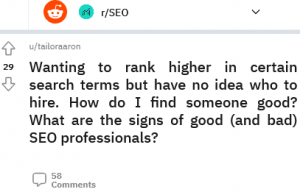Question for all you busy SEO users out there.
Do you set aside time (days, or even weeks) for research and catching up on Search Engine Optimization (SEO) strategy and tactics? If you run your own agency, do you give yourself and your staff time to read up on new SEO topics to improve your toolbox?
If you work in-house, do you ask for days set aside strictly for SEO reading or testing?
If you work for or have a manager position at a bigger agency, do you set aside time for SEO "self-improvement"?
I'm curious because I have a backlog of so many things I want to brush up and improve on. Schema, topical authority, semantic SEO, etc. But I don't really know how to communicate to my boss with our scheduling that I need this time to be the best SEO manager I can be.
Sometimes I think SEO users should be given mini-sabbaticals to keep up with the ever-changing landscape, but a lot of us (I know, including myself) are limited to reading an SEO article or 2 in the morning before getting to work.
Open discussion welcome.
18 👍🏽1839 💬🗨
📰👈
Great question and wish I had a better answer about better efficiency, but for me been day in day out for years juggling all of the above and it's energy intensive, always. One system that's helped me out is using Chrome plugin Raindrop.io to bookmark things I want to learn more about later (I have premium plan don't think costs much) and then I have a Zapier automation to add it to a Google sheet. You can add tags and then makes it easier to review your todo ideas & resources.
Honestly, same. I feel like this is a pretty common problem with no set solution. SEO changes every day. New tactics and test results come out every day. Professors get sabbaticals and their subject doesn't change/update a fraction as often as ours does.
I think this is part of the reason why a lot of SEO users are so stuck in their ways.
💟1
Afzal
I am an SEO Manager at an agency. What I usually do is encourage and empower my sub ordinates and juniors to set aside time daily to brush up on their concepts. Anything from workflow automation, tools and processes I know and implement daily for my clients is due to this single factor. Setting aside an hour daily for going down the rabbit holes will surely help in the long run.
💟1
This is the way.
Truslow 🎓
I spend an hour or so every day over coffee – and then again while I'm having lunch doing stuff like that.
Interestingly, some of the best learning I get is by reading questions here, devising a strategy in my head on how I would approach the situation, and then do some reading and research to verify that my advice would be sound and that I'm being fairly accurate before posting the response.
📰👈
Ammon 🎓
When I first started out, way, way back in the mid 90s, I did an 8 hour work-day, then spent another 8 hours just learning, looking stuff up, and practicing.
I kept going like that for some years, and whenever I didn't have a full 8 hour a day workload, that extra time also tended to go into my own test sites and experiments. I also put a lot of time into forums and groups, where I could put my knowledge to the test (if you can't explain stuff in simple language, you don't understand it yet), and could also learn from issues beyond my own experience.
By the year 2000, five years into my career, I'd built up more than enough reputation to charge more, thus need to do less hours of work to do just fine business-wise, and I still put in as much time as I could into constantly learning more, pushing myself, testing stuff.
In the early noughties I'd reached the point where I honestly only needed to do about 3 days of work in a month to pay all the bills, put my girlfriend through Uni (mature student, but I did find it fun to tease people I was dating a student), etc. And still I put in time every day into my own test sites, into reading papers and patents, and of course into being a pretty well known poster, moderator, and Admin of one of the top webmaster forums of the day.
AT work, I fought for my SEO team to have the same sort of situation as Googlers. One day out of their 5 day week *had* to be spent on projects not directly relating to the main work of the company, but into test sites, practice, and of course, learning new stuff. I consider 20% an absolute minimum investment if you want to get on top of this field of knowledge and stay there year after year.
💟👍🏽10
2 Quotes from a long ago interview I gave to Rand back when Moz was still SEOmoz specifically talk about this vital importance of R&D:
"It is important for any SEO company that is in for the long-haul to stop relying on getting all its ideas from forums and articles. You need to devise, test and develop new strategies continually. You need to train your own future staff to enrich the overall pool of SEO talent available.
This all feeds through into their treatment of work and clients of course. They have too little knowledge to have enough options available and so end up pushing clients into ill-fitting plans that can harm them."
And also:
"Ammon: R&D is absolutely essential. Not merely in attempting to determine much from viewing a handful of search results pages from the outside, but rather by knowing exactly what a given site is doing that is being rewarded, or degraded, for. The only way to do that is to know the history of such sites from the inside. In other words, sites you have complete control over and know exactly what has been going on with them since they were created.
To give that some context, the SEO company I am directing has the same commitment to R&D as Google itself does. Right down to having one day each week that must be devoted entirely to R&D and not to our ‘main jobs'. It's important to not only think outside the box, but to absolutely get outside of the box to check perspective regularly."
https://web.archive.org/web/20060409183409/http://www.seomoz.org/articles/ammon-johns-interview.phpThat's from 15 years ago and I promise you SEO hasn't gotten simpler. There are more options than ever to know and be able to consider.
WEB.
ARCHIVE.ORGSEOmoz | Articles >> Interview with Ammon
Daniel » Ammon
This reminds of something I said to another business owner the other day – I told him I always make time for my test projects because although about 80-90% of them turn out to be complete failures the other 10-20% become very lucrative.
💟1
Ammon 🎓 » Daniel
I'd even say there are no failures, just success in proving what didn't work so you never waste time on it that way again. 😃
Nathan » Ammon
I really like this response thread that you wrote. I've been stumped lately on testing. I have so many ideas on testing: maybe making a change to 5 articles and watching the data for movement for example. I wonder if this testing thing is related to change management and maybe if I can tie changes (inputs) to the data (outcome) automatically, I can see the effects quickly and on a larger scale. What are your thoughts on the relationship between change management and testing?
Ammon 🎓 » Nathan
The hardest part of any kind of testing is to attempt to recognize all the other variables that might have an effect, and find ways to account for them or eliminate them. Isolating what you want to test, and having a viable 'control group' to measure against is important.
For years, I maintained 30 'test sites' that spanned a wide range of topics and niches, some commercial, some completely not. The range was the key. With any update to the algo, just seeing which of my sites were affected, and knowing the full and complete history of what powered that site, what techniques I had used, what search signals I was mainly leveraging, meant I had a great starting position to analyze what had changed.
Daniel » Ammon
One thing that I do when breaking into a new niche is set up two sites. One that will be the really high quality site and another that I will f*ck about with to see what works. Something as simple as setting up mass blank pages with just a title or a little ai content on the test site can be used to identify easy to rank keywords in Google Search Console (GSC).
Nathan » Ammon
When you said "recognize all variables that might have an effect", that's what I was thinking when I thought of a change management system – if I can gather up all changes to that particular set of pages / sites, I can see what other things may be at play when looking at the data… Am I looking at this backwards? I wonder because you mention having 30 sites which makes me think you isolate and test NOT in a production environment but instead in more of a lab setting…
Nathan » Daniel
This is really useful!! I imagine you love seeing actual impressions instead of random keyword estimates that the various tools spit out. Do you even rely on keyword estimates when you have this? If so, in what way?
Ammon 🎓 » Nathan
I thought of my test sites as kind of like my own spider's web. By having that diversity of sites I knew 100%, with no doubts or questions, spanning a broad range of topics, markets, interests, commercial and hobby, etc. then when a new algo hit, I could see which sites it affected most or least, and thus give me a pretty good idea of what sort of things the algo change was affecting. The key is the diversity – some sites powered mainly by lots of links from authority sites, some by sheer volume of links from hobbyists and forums. Some sites mainly non-profit hobby sites, others about stuff that might be affected by Your Money or Your Life (YMYL) changes, etc. etc.
📰👈
Jack
I have a plan to learn Search Engine Optimization (SEO) going back 10 years. It's fairly easy for me now but you do definitely need a thorough knowledge of all aspects of SEO to apply it effectively to the situation. Knowledge informs the strategy and the strategy brings the results. The stuff I find the hardest is backlinks but I have found that good Press Release (PR) helps backlinks far greater than guest posts and content production. Personally I tackled on page the tech, the ux, then off page and then content Expertise, Authoritativeness, Trustworthiness (EAT)
Follosco
I work for an agency. I always read up on strategies and case studies and implement them on my own websites. I do it outside my work hours, and I enjoy learning new things and doing trial and error until I get things right. Gotta have the initiative if you don't wanna fall behind. Good thing I enjoy what I do or I would get burned out months ago.
🤔👍🏽2
You are absolutely right. Agencies tend to rely on their staff to self-train and improve their skills, unpaid, on their own time, but then use those enhanced skills for the benefit of the agency that didn't train them.
Basically, anyone working for an agency that doesn't actively train, mentor, and help employees to grow is begging those employees to leave the moment they can.
Every agency *ought* to be spending less time on head-hunting already qualified talent, and a lot more on helping to create the talent pool for the whole industry.
🤔👍🏽2
Follosco » Ammon
I'm taking notes of all these golden nuggets for the culture of a future agency I "might" build, if I continue down this path (there are many ways to make money if you know SEO, after all. Not just through client work). Thanks for sharing insights from your years of experience. I really enjoy learning and hearing the perspective of industry experts. Followed you on LinkedIn, by the way. 🙂
Slawski
I spend a lot of time reading patents, blog posts, and papers and tweets looking for information, new approaches by search engines, and new topics to reseach. It has become an important aspect of my job as Director of SEO Research. I often break down newly granted patents to learn about the assumptions behind them as they relate to search, searchers, and the web. Learning about new questions to ask, and to look for questions to answer are important parts of my job as well. Learning, and teaching others what I learn is now the focus of my job.
💟🤔👍🏽5
Jubair
Reading, testing, networking, communicating is the most important part of our life. It's like food, that you have to eat however you're busy, but still, you have to eat to make yourself alive.
I'm super busy, working with a lot of companies (local SEO), I have 15+ team members, but still I'm reading everyday, networking, making connections, commenting, taking advice from others and testing things.
mmm, you have to do things smartly, otherwise you will waste a lot of time into it.
I have 2 different sheet to maintain my daily works. One is my clients sheet, that also manage by me and my team and 2nd is my daily routine and urgent tasks, also I'm using a notepad to check out whats the most priority works that I have to complete today.
This is how I'm managing my works, reading, networking, in very simple way.
📰👈
How important is an SEO agency to rank their Agency Site for Main Buyer Intent Keyword?
